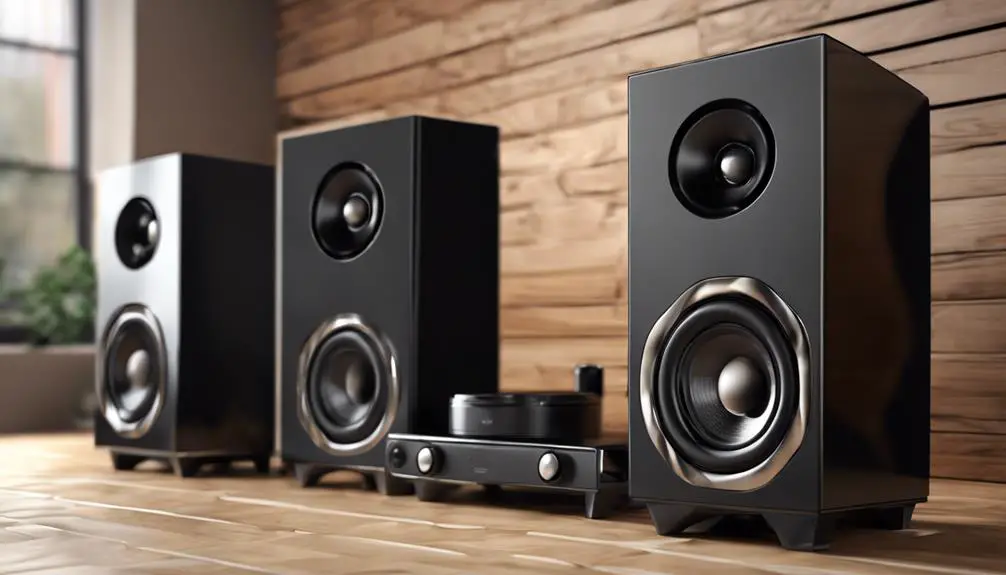Choosing between 4 ohm and 8 ohm speakers can feel like deciding the fate of your entire audio experience. You might think all speakers are created equal, but the differences in impedance can profoundly impact sound quality and amplifier compatibility. If you're leaning towards high-volume scenarios, the performance of 4 ohm speakers might pique your interest, yet they can also come with challenges. On the other hand, 8 ohm speakers promise reliability but at what cost? Exploring these nuances can clarify what best suits your setup and listening habits.
Understanding Impedance
Impedance, measured in ohms, determines how much resistance your speakers will put up against the electrical current from your amplifier. When you're choosing between 4 ohm and 8 ohm speakers, it's vital to understand how impedance affects your sound system's performance and safety.
Lower impedance, like 4 ohms, can draw more power from your amplifier, which can lead to increased volume and potentially better sound quality. However, this also means your amp may work harder, generating more heat. You need to verify your amplifier can handle this load without overheating or getting damaged. If you're using an amplifier that's not designed for lower impedance, you risk overloading it, which could lead to failure or even a fire hazard.
On the other hand, 8 ohm speakers offer a higher resistance, leading to less current draw and a more stable operation. This can be safer for both your amplifier and your speakers, especially if you've got a less powerful amp. Always check your equipment's specifications to match the impedance correctly. Doing so not only maximizes performance but also guarantees a safer listening experience.
Performance Comparison
When comparing the performance of 4 ohm and 8 ohm speakers, you'll notice distinct differences in power handling and sound output. Generally, 4 ohm speakers can draw more power from your amplifier, leading to higher sound levels. However, they can also put more strain on your equipment, so it's essential to make certain that your amp can handle the load without overheating.
Here's a quick comparison to help you understand:
| Feature | 4 Ohm Speakers | 8 Ohm Speakers |
|---|---|---|
| Power Handling | Higher | Lower |
| Sound Output | Louder | Softer |
| Strain on Amplifier | More Strain | Less Strain |
Choosing the right speaker depends on your setup and listening preferences. If you want louder sound but have a compatible amp, 4 ohm speakers might be your choice. However, if you prioritize safety and want to avoid any potential damage to your gear, 8 ohm speakers could be more suitable. Always consider the specifications of your equipment to guarantee a safe and enjoyable audio experience.
Compatibility With Amplifiers
The choice between 4 ohm and 8 ohm speakers considerably impacts how well they'll work with your amplifier. When you connect speakers to your amp, the impedance (measured in ohms) plays a vital role in compatibility. An amplifier can generally handle either 4 ohm or 8 ohm loads, but it's important to match them appropriately to avoid potential damage.
If your amplifier is rated for 4 ohm speakers, using 8 ohm speakers might not output the desired volume. Conversely, if you connect 4 ohm speakers to an amp designed for 8 ohm loads, you risk overloading the amplifier. This could lead to overheating or even permanent damage.
Before you make any connections, check your amplifier's specifications. Most amplifiers will list the compatible speaker impedances. By ensuring you're using the correct impedance, you can maintain sound quality and protect your equipment. It's also wise to avoid daisy-chaining multiple speakers without considering their total impedance. This practice can lead to unsafe operating conditions. Always prioritize safety and consult your amplifier's manual if you're unsure. Proper compatibility keeps your system running smoothly and helps prevent costly repairs.
Choosing the Right Option
Choosing between 4 ohm and 8 ohm speakers depends on your specific audio needs and the equipment you have. First, think about your amplifier. If it's designed to handle lower impedance loads, 4 ohm speakers might give you a richer sound and increased power. However, using them with an amp that isn't rated for lower impedance can lead to overheating and possible damage, so be cautious.
On the other hand, 8 ohm speakers usually provide a safer option for most home audio systems. They're compatible with a wider range of amplifiers and can be easier to drive, which can help prevent any potential issues related to overheating. If you're looking for reliability and longevity, especially in a home environment, 8 ohm speakers may be the way to go.
Consider your listening habits too. If you enjoy loud volumes and dynamic sound, and your amp supports it, then 4 ohm speakers might meet your needs. For more casual listening, 8 ohm speakers will likely suffice. Ultimately, prioritizing compatibility and safety will lead you to the right choice for your sound system.

